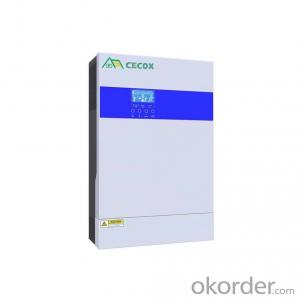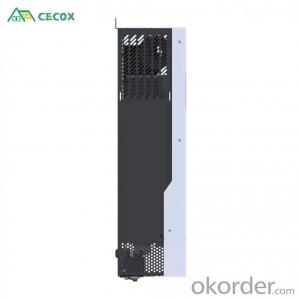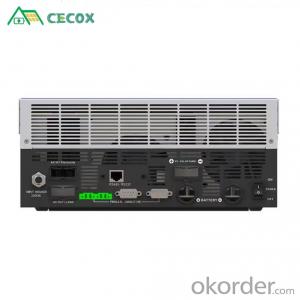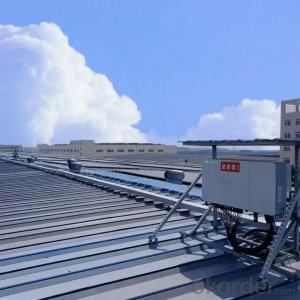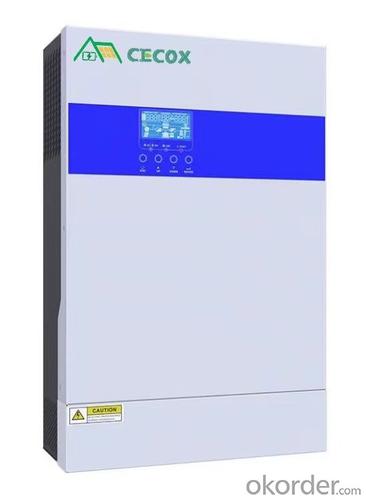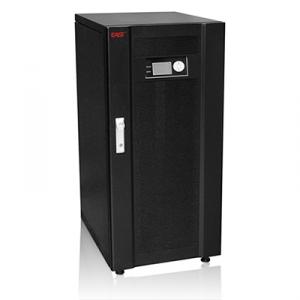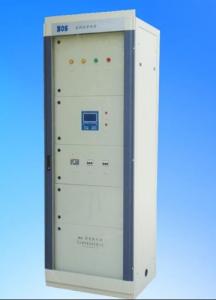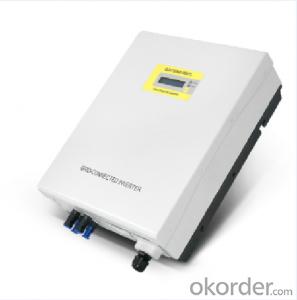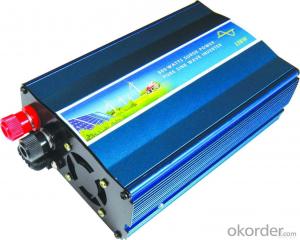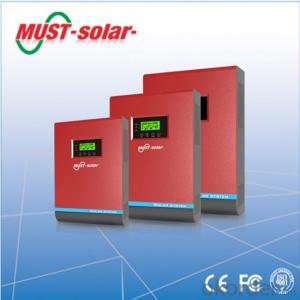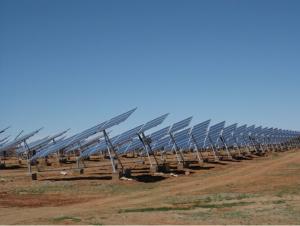Solar Inverter Battery Charger - 5.5kW Off-Grid Hybrid Solar Home Inverter with MPPT Charge Controller
- Loading Port:
- China main port
- Payment Terms:
- TT OR LC
- Min Order Qty:
- 1 unit
- Supply Capability:
- 10000 unit/month
OKorder Service Pledge
OKorder Financial Service
You Might Also Like
Specification
Advantages
110A PV MPPT input
Wide PV input voltage range
Overload/overtemperature/short circuit protection
Smart battery charger design to optimize battery performance
Support mains/generator input
Adaptive lithium battery
Support maximum parallel machine (P model)
Multiple charging voltages, suitable for different batteries
Multiple working modes: mains priority, PV priority
Key Parameters
Output Type:Single, Pure Sine Wave
Type:DC/AC Inverters
Inverter Efficiency:94%
Place of Origin:China
Model Number:XN5548, XN5548-P
Input Voltage:48V DC
Output Voltage:230V AC ± 5%
Output Current:23A
Output Frequency:50Hz/60Hz
Size:472W*297H*133D mm
Certificate:CE/IEC/ISO/TUV
Warranty:5 years
Weight:10.5kg
5.5KW Off-grid Hybrid Solar Home Inverter WithMPPT Charge Controller
Battery Type:Lithium/Lead-acid
Rated Power:5500W
Waveform:Pure Sine Wave
Transfer Time:10ms
Maximum PV Array Power:6000W
Maximum Solar Charge Current:110A
AC Input Voltage:230V AC
Communication Port:RS232 / RS485
Packaging and delivery
Package Type:Standard Export Package
Supply Ability:10000 Unit/Units per Month
Lead Time
Quantity (units) 1 - 100 101 - 500 501 - 1000 > 1000
Lead time (days) 7 14 21 To be negotiated
Customized packaging:(Min. order) 50000sets
- Q: Can a solar inverter be upgraded or expanded?
- Yes, a solar inverter can be upgraded or expanded. Upgrades can involve installing additional features, improving efficiency, or increasing capacity. Expansion can involve connecting multiple inverters in parallel or series to accommodate larger solar installations. However, it is important to ensure compatibility and consult with a professional to ensure the upgrade or expansion is done correctly.
- Q: What is the role of a frequency regulation feature in a solar inverter?
- The role of a frequency regulation feature in a solar inverter is to maintain a stable and consistent frequency of the electricity being generated by the solar panels. This is important because the electrical grid requires a specific frequency for efficient and reliable operation of electrical appliances and devices. The frequency regulation feature in a solar inverter ensures that the electricity generated by the solar panels is synchronized with the grid's frequency, thereby enabling seamless integration and optimal utilization of solar power.
- Q: Can a solar inverter be used for residential applications?
- Yes, a solar inverter can be used for residential applications. In fact, it is commonly used in residential solar power systems to convert the direct current (DC) generated by solar panels into alternating current (AC) that can be used to power household appliances and electronics.
- Q: Do I need a special inverter for a battery storage system?
- Yes, a special inverter is needed for a battery storage system. Unlike a regular inverter that converts DC power from solar panels into AC power for immediate use, a battery storage system requires an inverter that can not only convert DC power to AC power but also manage the charging and discharging of the batteries efficiently. This special inverter is designed to work seamlessly with the battery storage system, ensuring optimal performance and maximizing the utilization of stored energy.
- Q: Can a solar inverter be used with a solar-powered refrigerator?
- Yes, a solar inverter can be used with a solar-powered refrigerator. A solar inverter is responsible for converting the direct current (DC) produced by solar panels into alternating current (AC) that can be used to power appliances, including refrigerators. Therefore, a solar inverter is an essential component in connecting a solar-powered refrigerator to a solar panel system.
- Q: Can a solar inverter be used with a wireless communication system?
- Yes, a solar inverter can be used with a wireless communication system. Solar inverters convert the direct current (DC) generated by solar panels into alternating current (AC) that can be used to power electrical devices. Wireless communication systems typically operate on AC power, so a solar inverter can be employed to convert the DC power generated by solar panels into AC power for the wireless communication system. This allows for the use of renewable energy to power the wireless communication system, reducing reliance on traditional energy sources.
- Q: Can a solar inverter be repaired or replaced if it malfunctions?
- Yes, a solar inverter can be repaired or replaced if it malfunctions. In many cases, minor issues can be fixed through repairs, such as replacing faulty components or updating firmware. However, if the inverter is extensively damaged or beyond repair, it may need to be replaced with a new one. Ultimately, the course of action will depend on the severity of the malfunction and the expertise of the technician assessing the situation.
- Q: What is the role of a solar inverter in fault ride-through capability?
- The role of a solar inverter in fault ride-through capability is to ensure that the solar power system remains operational and stable during grid faults or disturbances. The inverter is responsible for detecting fault conditions and adjusting its output to mitigate the impact of the fault on the system. By providing fault ride-through capability, the solar inverter helps maintain grid stability and ensures continuous power supply from the solar panels even in the presence of faults.
- Q: Can a solar inverter be connected to a computer or smartphone?
- Yes, a solar inverter can be connected to a computer or smartphone. Many modern solar inverters come with built-in Wi-Fi or Bluetooth connectivity, allowing users to monitor and control their solar energy system through dedicated apps or web portals on their computers or smartphones. This enables real-time monitoring of energy production, system performance, and even allows for remote troubleshooting and adjustments.
- Q: Can a solar inverter be used in a smart grid system?
- Yes, a solar inverter can be used in a smart grid system. A solar inverter is responsible for converting the direct current (DC) generated by solar panels into alternating current (AC) that can be used to power homes and businesses. In a smart grid system, the solar inverter can play a crucial role in integrating solar energy into the grid, enabling bi-directional energy flow, and facilitating real-time communication and control between the solar system, grid operators, and consumers. This allows for efficient energy management, improved grid stability, and optimization of renewable energy utilization within the smart grid network.
Send your message to us
Solar Inverter Battery Charger - 5.5kW Off-Grid Hybrid Solar Home Inverter with MPPT Charge Controller
- Loading Port:
- China main port
- Payment Terms:
- TT OR LC
- Min Order Qty:
- 1 unit
- Supply Capability:
- 10000 unit/month
OKorder Service Pledge
OKorder Financial Service
Similar products
Hot products
Hot Searches
Related keywords

